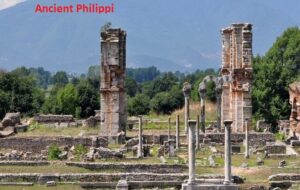History:
In 1990, an archaeologist found a tomb in Philippi full of golden treasures, a find second only to Tutankhamen’s tomb in Egypt. It was the tomb of Philip, the king of Macedonia (the northern part of Greece), after whom the city was named. He was the son of the famous Alexander the Great who built vast empire before his death at the age of 31.
Philip was the scene of some key ancient battles. In 168 BC, the Romans came and conquered the people. In 42 BC Anthony beat Brutus and Cassius at Philippi. In 31 BC Anthony and Cleopatra were defeated and killed there. Having been such a key battleground, the Romans made it a colony. The Emperor Augustus gave it a pompous name: ‘Çolonia Julia Augusta Philipensis,’ but people called it simply Philippi for short. It was a mini metropolis and it was given exactly the same rights as if it were a Roman soil and so many Romans settled there.

Ancient Philippi
The city was renamed by Philip-II of Macedon in 356 BC and abandoned in the 14th century after the Ottoman conquest. The present municipality Filippoi, is located near the ruins of the ancient city and is part of the region of East Macedonia and Thrace in Kavalla, Greece. It was made a World Heritage Site in 2016.
Key-verses:
“Then make my joy complete by being like minded, having the same love, being one in spirit and purpose” (2:2).
“Rejoice in the Lord always, I will say it again: Rejoice!” (4:4)
“Continue to work out your salvation with fear and trembling” (2:12b).
“I press on toward the goal to win the prize for which God has called me heavenward in Christ Jesus” (3:14).
“Finally, brothers, what is true, what is noble, whatever is right,…”(4:8).
Purpose:
- To thank the Christians at Philippi for the gifts that they had sent him by Epaphroditus.
- To inform the Christians at Philippi about his own circumstances. He also wanted to tell them that Epaphroditus had recovered from his dangerous illness. He was returning to Philippi.
- To appeal for unity and for the end of quarrels in the church.
- To warn them about false doctrine and also the Jewish Christians who insisted on circumcision for Gentiles.
- To urge them to remain loyal to their faith and to stand firm against opponents.
- Paul was in prison when he wrote this letter. He was not sure of the result of a trial. Some writers suggest that the prison was in Ephesus or Caesarea. But it is more likely that he was in Rome. He probably wrote this letter at the end of the two years that we read about in Acts 28:30.
Out line of the Letter:
| Chapt. | Title |
| 1 | Great joy in suffering:
i. Expression of gratitude and supplication. (1:1-11) ii. Furtherance of the Gospel. (1:12-30) |
| 2 | Believers to learn from Christ’s pattern.
i. Imitating Christ. (2:1-11) ii. How to achieve the best: (2:12-30). |
| Great joy in believing the Lord Jesus Christ:
i. Put no confidence in the flesh: (3:1-6) ii. The losses and gains of Paul: (3:7-11) iii. A great Christian life: (3:12-16) iv. The future of believers: (3:17-21) |
|
| 4 | Peace and Joy in all circumstances:
i. How to win over worry: (4:1-9) ii. The secret of contentment: (4:10-20) |
| BIBLIOGRAPHY |